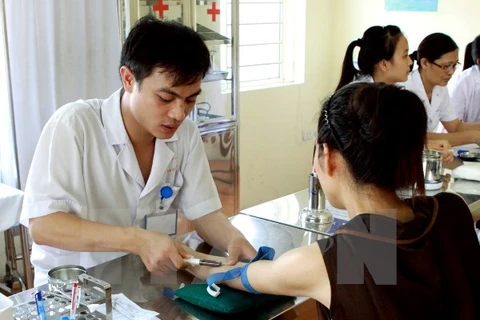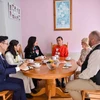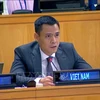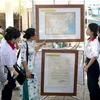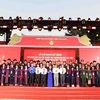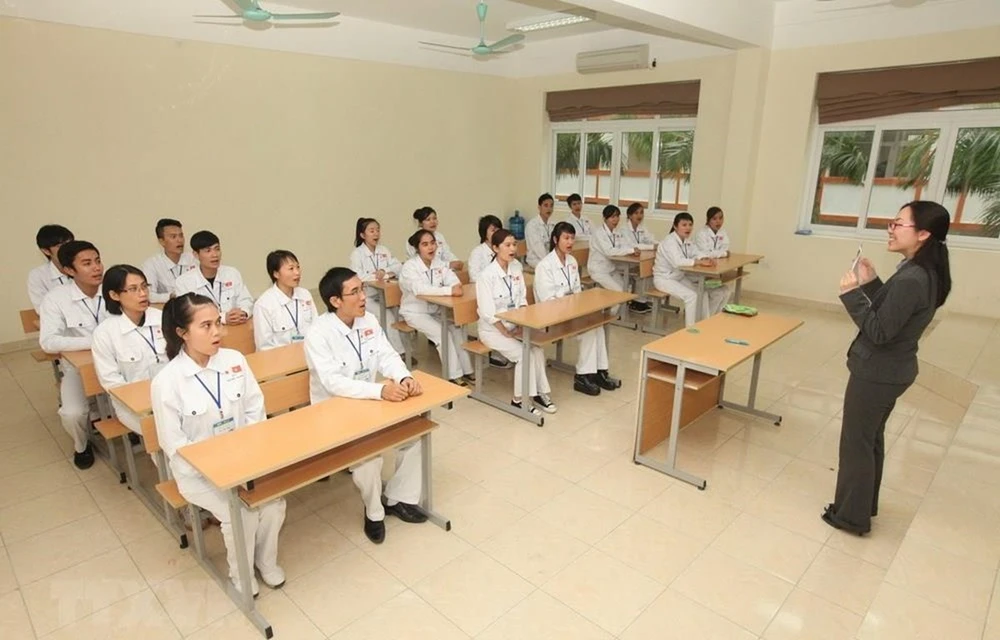
Hanoi (VNA) – Vietnamese nurses and caregivers sent to Japan have proved their outstanding capacity compared to their peers from other countries, evidently through the outcomes of national tests in the country.
Vietnamese nurses and caregivers in Japan have been complimented by hospitals and elderly nursing facilities for their hardworking and enthusiasm at work. Meanwhile, they are also qualified in professional capacity and Japanese language to perform the jobs that their Japanese peers are taking.
The information was revealed by the Japanese side at a conference to review the cooperation programme to send nurse and caregiver candidates to Japan to work under the Vietnam-Japan Economic Partnership Agreement (VJEPA) in the 2012-2019 period, which was held by the Department of Overseas Labourers under the Ministry of Labour, Invalids and Social Affairs (MOLISA) in Hanoi on November 12.
Outstanding Vietnamese candidates
The programme to send Vietnamese nurses and caregivers to Japan has been implemented from 2012 within the framework of the VJEPA. In seven years of implementation, the Department of Overseas Labourers have coordinated with the Japanese Embassy in Vietnam and partners to recruit and give Japanese training to 1,670 trainees in eight courses. As many as 1,340 nurses of seven courses have been sent to Japan to work in hospitals and elderly nursing centres.
MOLISA Deputy Minister Nguyen Ba Hoan said that Japan is one of the major labour markets to which Vietnam has sent workers. The cooperation in sending nurses to Japan is a bright spot in the work thanks to its high efficiency, contributing to expanding the labour cooperation between the two countries.
After seven years of implementation, the programme has also shown a number of shortcomings as some candidates have left their jobs before the contract’s expire date, and difficulties in recruiting nurses for the market where demands are rising.
However, the major reached objectives of the programme include Vietnamese nurse and caregiver candidates arriving in Japan passing the national tests to get certificates after a certain time of working in the country.
Through the national tests of Japan, the Vietnamese candidates have affirmed their outstanding capacity compared to their peers from other countries with the high passing ratios of 37 percent among nurses and 91 percent among caregivers. The ratios are about over 10 percent and more than 30 percent, respectively, for their peers from other countries.
High demand for nurses, caregivers
Vietnamese nurses and caregivers have been highly evaluated for their hardworking and enthusiasm at work, with high professional and Japanese language capacity.
Therefore, the demand for Vietnamese nurses and caregivers is higher than the number of recruited and trained candidates each year. Currently, Japanese medical facilities have shown high hope to receive more nurses and caregivers from Vietnam.
 Hayashi Mikio, First Secretary at the Japanese Embassy in Vietnam, addresses the conference (Photo: VNA)
Hayashi Mikio, First Secretary at the Japanese Embassy in Vietnam, addresses the conference (Photo: VNA) Hayashi Mikio, First Secretary at the Japanese Embassy in Vietnam, said that Japanese hospitals’ and nursing homes’ high evaluation of Vietnamese nurses and caregivers and the high ratio of passing the Japanese national tests manifested the efficient cooperation of agencies from both countries as well as the Japanese teaching centres.
He said that the programme is also appreciated by the Japanese Government.
As the supply of nurses and caregivers is below Japan’s demand, the country is offering attractive policies to lure more candidates, he noted.
Vietnam is the third country to make a deal with Japan to send nurses and caregivers to work in the country after Indonesia and the Philippines. To join the programme, candidates have to complete a 12-month training course at home and pass a Japanese language test. After arriving in Japan, they will take a national test for nurses and caregivers to receive certificates to work in the country. Nurses will be paid about 30 million VND (1,300 USD) per month, while caregivers will receive up to 33 million VND (1,426 USD) per month, along with other allowances./.

